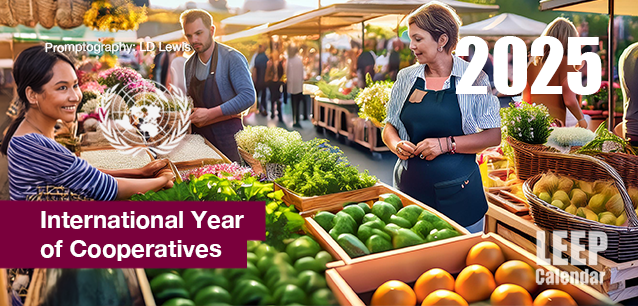 AD
AD
Today is: December 06
Scroll to explore events active on this date.
Additional Events on LEEP
LEEP INK FEATURES

August? Absolutely!
In August, we live through the Dog Days of Summer. It's hot and often humid, and those who can leave for better climates do. Down south, winter is in full force. August is also known as "the ...

In The Heat of July: July 2025 Events
Is it hot enough (or cold enough if you're below the equator) for you yet? There is actually a day for that! Like every month, I pick a diverse collection of events you may or may not know about. This ...

May Blooms: Events in May 2025
Along with October, May is one of the most densely packed months of the year. It's before the summer humidity and the last whole month of the school year. The weather is warming in t...
About International Year of Cooperatives
Career , Finance & Banking
Family & Friends , Politics
Ends: Dec 31, 2025
DESCRIPTION:
UNITED NATIONS'
INTERNATIONAL YEAR OF COOPERATIVES
The United Nations declared 2025 the International Year of Cooperatives (IYC) to highlight cooperatives' role in socio-economic development, promote their formation and growth, and raise public awareness of their contributions to economic stability and community building.OBJECTIVES
Raise Awareness—Increase public understanding of the benefits of cooperatives and their contributions to social and economic development.
Promote Growth—Encourage the formation and growth of cooperatives worldwide.
Strengthen Partnerships—Foster and enhance partnerships between cooperatives, governments, and other stakeholders.
Showcase Impact—Demonstrate how cooperatives improve people's lives and strengthen communities.WHAT ARE COOPERATIVES?
Cooperatives are member-owned, member-controlled enterprises that operate for the benefit of their members through voluntary and open membership principles, democratic member control, economic participation, autonomy and independence, education, training, and information, cooperation among cooperatives, and concern for the community.IMPACT ON LIFE AND ECONOMIES
Economic Stability—Cooperatives contribute to financial stability by creating jobs, supporting local economies, and generating income for their members.
Social Benefits—They provide benefits such as improved access to goods and services, enhanced social cohesion, and the promotion of democratic values.
Sustainability—Many cooperatives prioritize sustainable practices, contributing to environmental conservation and responsible resource management.
Empowerment—Cooperatives empower members by giving them a say in decision-making processes and enabling them to benefit directly from their enterprises.HISTORY OF COOPERATIVES
The cooperative movement's roots are in the 19th century, although cooperative practices can be traced back to earlier times.
The modern cooperative movement began with the Rochdale Pioneers in England in 1844. They established the Rochdale Society of Equitable Pioneers, considered the prototype of modern cooperatives. Their principles, known as the Rochdale Principles, became the foundation for cooperative organizations worldwide.
The cooperative model quickly spread across Europe and North America, adapting to various economic sectors, including agriculture, retail, finance, and housing.
Throughout the 20th century, cooperatives expanded globally, especially in developing countries, to combat poverty, enhance food security, and provide essential services.
Today, cooperatives play a crucial role in economies worldwide, with millions of members benefiting from cooperative enterprises in diverse sectors such as agriculture, banking, health care, and energy.
The United Nations' International Year of Cooperatives in 2025 is pivotal for recognizing and promoting cooperatives' significant contributions to sustainable development and community well-being. This recognition continues to support cooperatives' growth and influence in the global economy.
VIDEOS
SUPPORTING DOCUMENTS
Currently, this event does not have supporting documents.
ADDITIONAL IMAGES
Currently, this event does not have supporting images.
Where would you like to go now?
 AD
AD


/footer-logo.svg)
